JavaScript is disabled for your browser. Some features of this site may not work without it.
Buscar en RiuNet
Listar
Mi cuenta
Estadísticas
Ayuda RiuNet
Admin. UPV
THE OUTSTANDING UNIVERSAL VALUE OF THE HISTORIC COLONIAL CENTRE OF THE CITY OF GRACIAS (HONDURAS)
Mostrar el registro sencillo del ítem
Ficheros en el ítem
| dc.contributor.author | Viñals Blasco, Mª José
|
es_ES |
| dc.contributor.author | Teruel Serrano, Mª Dolores
|
es_ES |
| dc.contributor.author | Alonso-Monasterio Fernandez, Pau
|
es_ES |
| dc.date.accessioned | 2021-07-13T03:31:08Z | |
| dc.date.available | 2021-07-13T03:31:08Z | |
| dc.date.issued | 2020-07-24 | es_ES |
| dc.identifier.uri | http://hdl.handle.net/10251/169149 | |
| dc.description.abstract | [EN] This paper analyses the outstanding universal values, integrity, and authenticity of the city of Gracias (Honduras), as well as its protection and heritage management tools. The main objective is to demonstrate that Gracias meets the UNESCO requirements to qualify as a candidate for inclusion in the International List of the World Heritage Convention (1971). Gracias is a colonial Spanish city, founded in 1536, in the region of Lempira. It had great productive, strategic and administrative importance in Central America, demonstrated in part by its hosting of the Audiencia de los Confines. The Audiencia was the highest court of the Spanish Crown with jurisdiction over the current republics of Guatemala, Belize, El Salvador, Honduras, Nicaragua, Costa Rica and the region of Chiapas. The aim of this court was to represent the interests of the indigenous people in these areas. An on-site analysis, diagnosis and assessment of the heritage elements was carried out from architectural, urban planning, historical, and intangible heritage perspectives. Additionally, other similar sites in Central America have been analysed for comparison. Results show that this city meets criterion iv of the World Heritage Convention: an outstanding example of a type of building, architectural or technological ensemble or landscape which illustrates (a) significant stage(s) in human history. Furthermore, the city's heritage assets are well-preserved and most of them remain functional; the indigenous culture is alive; and planning, conservation and managing tools are in use. Currently, Gracias maintains its harmony and life and its respect for the natural environment, creating a cultural landscape that has been maintained for almost 500 years. | es_ES |
| dc.language | Inglés | es_ES |
| dc.publisher | Copernicus Publ. | es_ES |
| dc.relation.ispartof | International Archives of the Photogrammetry, Remote Sensing and Spatial Information Sciences (Online) | es_ES |
| dc.rights | Reconocimiento (by) | es_ES |
| dc.subject | Heritage | es_ES |
| dc.subject | Tentative list | es_ES |
| dc.subject | Spanish Colonial City | es_ES |
| dc.subject | Historic centre | es_ES |
| dc.subject | Gracias (Lempira, Honduras) | es_ES |
| dc.subject.classification | GEOGRAFIA FISICA | es_ES |
| dc.subject.classification | ECONOMIA, SOCIOLOGIA Y POLITICA AGRARIA | es_ES |
| dc.title | THE OUTSTANDING UNIVERSAL VALUE OF THE HISTORIC COLONIAL CENTRE OF THE CITY OF GRACIAS (HONDURAS) | es_ES |
| dc.type | Artículo | es_ES |
| dc.type | Comunicación en congreso | es_ES |
| dc.identifier.doi | 10.5194/isprs-archives-XLIV-M-1-2020-565-2020 | es_ES |
| dc.rights.accessRights | Abierto | es_ES |
| dc.contributor.affiliation | Universitat Politècnica de València. Departamento de Ingeniería Cartográfica Geodesia y Fotogrametría - Departament d'Enginyeria Cartogràfica, Geodèsia i Fotogrametria | es_ES |
| dc.contributor.affiliation | Universitat Politècnica de València. Departamento de Economía y Ciencias Sociales - Departament d'Economia i Ciències Socials | es_ES |
| dc.description.bibliographicCitation | Viñals Blasco, MJ.; Teruel Serrano, MD.; Alonso-Monasterio Fernandez, P. (2020). THE OUTSTANDING UNIVERSAL VALUE OF THE HISTORIC COLONIAL CENTRE OF THE CITY OF GRACIAS (HONDURAS). International Archives of the Photogrammetry, Remote Sensing and Spatial Information Sciences (Online). 44:565-572. https://doi.org/10.5194/isprs-archives-XLIV-M-1-2020-565-2020 | es_ES |
| dc.description.accrualMethod | S | es_ES |
| dc.relation.conferencename | HERITAGE2020 (3DPast | RISK-Terra), International Conference on Vernacular Architecture in World Heritage Sites. Risks and New Technologies | es_ES |
| dc.relation.conferencedate | Septiembre 09-12,2020 | es_ES |
| dc.relation.conferenceplace | Valencia, España | es_ES |
| dc.relation.publisherversion | https://doi.org/10.5194/isprs-archives-XLIV-M-1-2020-565-2020 | es_ES |
| dc.description.upvformatpinicio | 565 | es_ES |
| dc.description.upvformatpfin | 572 | es_ES |
| dc.type.version | info:eu-repo/semantics/publishedVersion | es_ES |
| dc.description.volume | 44 | es_ES |
| dc.identifier.eissn | 2194-9034 | es_ES |
| dc.relation.pasarela | S\422955 | es_ES |
| dc.subject.ods | 01.- Erradicar la pobreza en todas sus formas en todo el mundo | es_ES |
| dc.subject.ods | 11.- Conseguir que las ciudades y los asentamientos humanos sean inclusivos, seguros, resilientes y sostenibles | es_ES |
| dc.subject.ods | 03.- Garantizar una vida saludable y promover el bienestar para todos y todas en todas las edades | es_ES |
| dc.subject.ods | 04.- Garantizar una educación de calidad inclusiva y equitativa, y promover las oportunidades de aprendizaje permanente para todos | es_ES |
| dc.subject.ods | 08.- Fomentar el crecimiento económico sostenido, inclusivo y sostenible, el empleo pleno y productivo, y el trabajo decente para todos | es_ES |
| dc.subject.ods | 09.- Desarrollar infraestructuras resilientes, promover la industrialización inclusiva y sostenible, y fomentar la innovación | es_ES |








